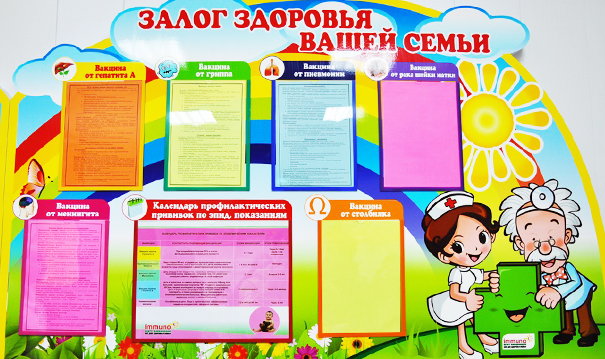Tips for parents
The rules of conduct for vaccination
If the child is healthy and does not suffer from allergies, was not ill or in contact with infectious patients in the preceding two weeks, a vaccination will not be threatening as far as complications are concerned and in most cases will be well tolerated.
It is important to follow the vaccination calendar and know in advance how and when the child should be vaccinated. If you missed a vaccination for medical or other sound reasons, be sure to resume vaccination activities after the due date.
In preparation for a vaccination, you must identify contraindications in which the vaccination may cause serious adverse reactions. When children have certain illnesses, vaccination is strictly prohibited, but permission to vaccinate can be obtained later. This decision must be made by a competent physician.
To determine the presence of contraindications, a doctor at Immuno-C Vaccination Center will examine each child. This is mandatory before inoculation. Ask your doctor about all possible side reactions that can occur after vaccination, and find out what to do in case they appear. Parents should observe a few simple rules to help protect the child and reduce the risk of complications to a minimum.
Before the first DPT vaccination, consult a doctor in order to make a general analysis of blood and urine samples and also with a neurologist so that permission to carry out the vaccination can be given.
If a child is ill on the eve of vaccination or had contact with infectious patients, inform the pediatrician. Perhaps the vaccination will be postponed for a while.
A few days prior to vaccination, do not introduce any new foods to the child’s diet. This also applies to breastfed babies where it is better to keep to the usual mother’s diet. This will save the baby from unexpected allergic reactions caused by the change of diet, rather than by the effect of vaccination. Without specific instructions from the doctor, you must not give your child any new medication a week before the vaccination.
Intake of antihistamines or antipyretics is allowed only on medical prescription, which will select the necessary medication correctly and calculate the dose based on the child’s weight and susceptibility to allergic reactions. Typically, antihistamines are prescribed for children who are susceptible to allergic reactions, or those who have had previous allergic reactions caused by vaccination.
Children younger than 6 years who are prone to febrile seizures (sudden jerky convulsions with high temperature over 38oC) receive antipyretic drugs, prescribed by the doctor, immediately before or after vaccination. Be sure to tell the doctor conducting the preparations for the vaccination that your child is prone to febrile seizures.
Ask your doctor about all possible adverse reactions that may occur after vaccination, and find out what to do if they occur.
Do not leave the vaccination center immediately after a vaccination. Remain for half an hour to make sure of the condition of the baby, and when you are satisfied that he is all right you can go home. In rare cases, a vaccination may cause collapse or anaphylactic shock, and the doctors at the Center will deal with this if it occurs.
The child may experience a decrease in appetite after vaccination and this is a natural reaction. If there is diarrhea, vomiting, fever, or the child stops drinking, it must receive the required amount of liquid and you should consult our Centre. Occasional vomiting or diarrhea should not be a cause for concern in the short-term.
An increase in temperature is a normal reaction in a child that has been vaccinated. If the child is healthy, it is not necessary to bring down the temperature if it is less than 38.5o C. At higher temperatures, consult a doctor to observe your child and he will prescribe an antipyretic agent.
If a child has a predisposition to febrile convulsions, as a precaution, have the neurologist prescribe an antipyretic before the vaccination. If, after the vaccination the temperature of the child reaches 37.5oC, bring the temperature down with the prescribed medicine. Redness or swelling that often occurs at the injection site, do not require special treatment or independent testing. If the child is scratching the injection site, cover it with a gauze bandage. Painful lumps may appear at the injection site after DPT vaccination but they go away on their own after a certain time. Do not worry if the child limps on the leg in which the injection was administered. In a few weeks the lump will disappear.
A healthy child who does not have allergic reactions or high temperature after vaccination, can lead a normal life as he did before the vaccination. It is possible to walk or swim but the child should not rub the injection site.
When do you need to take the child to a doctor or call an ambulance?
Immediately:
- If the child has a high temperature that cannot be brought down by a fever reducer
- If there are convulsions and/or loss of consciousness
- When there is restless behavior and refusal to eat and drink
- When there is a festering sore on the site of inoculation
- When a baby cries continuously for over 2 hours




